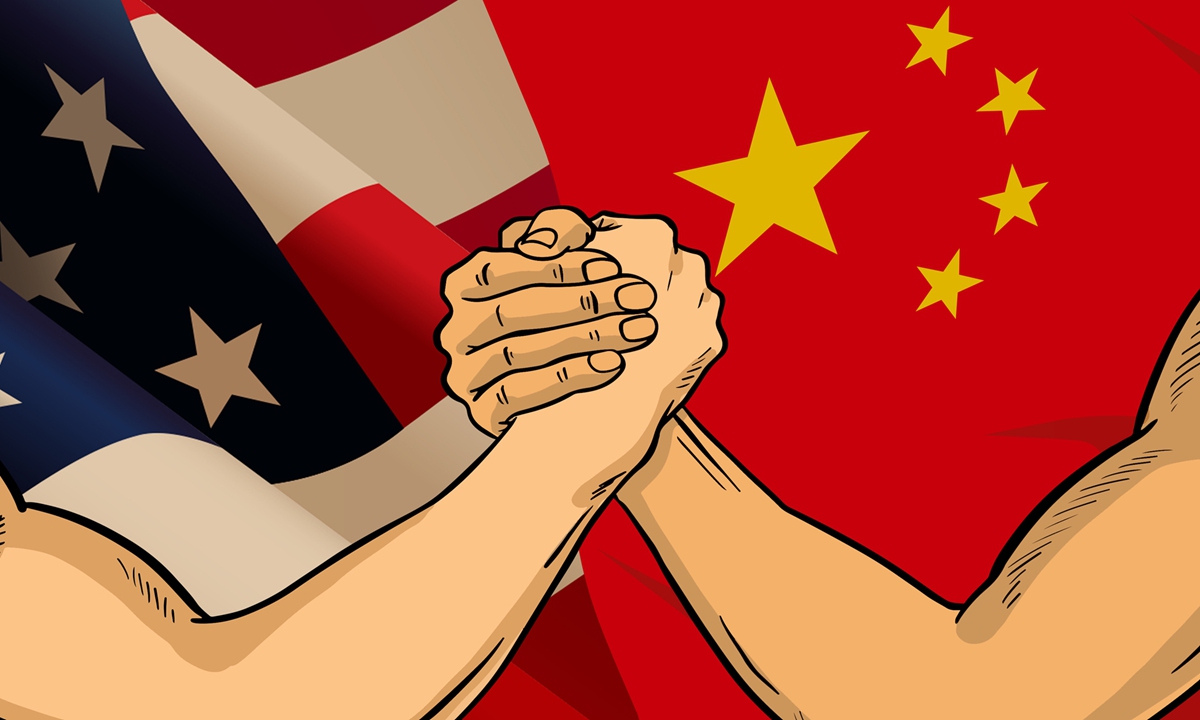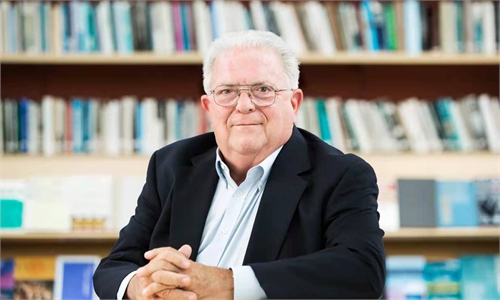
China-US relations Photo: GT
Editor's Note:
Whether or not a new cold war between China and the US is emerging is yet to be seen. Yet observers and media outlets predicting this way is on a sharp rise in the wake of Russian Foreign Minister Sergey Lavrov' visit to China in March. Both China and Russia have stressed that they are not forging an alliance. This fact is not stopping some Western media outlets from thinking that the enhancement of China-Russia ties is actually making a new alliance and may trigger a new cold war. How does a Cold War expert view the current confrontation between China and the US and the development of the world order? Odd Arne Westad (Westad), an Elihu Professor of History and Global Affairs at Yale University, shared his views in a written interview with Global Times (GT) reporter Li Aixin.
GT: What is your take on the increasing cold war rhetoric regarding China, Russia, and the US from Western media analyses?
Westad: I think that China and Russia will continue to cooperate closely in some areas, but without it becoming a formal alliance. Even if the Sino-Russian relationship should develop into an informal alliance, that in itself is not a return to the Cold War pattern, since the cooperation between the two is based on shared interests, not ideology.
GT: According to some US media reports, the US seems to believe that the deepening Beijing-Moscow relationship has intensified their confrontation with Washington. However, according to Chinese and Russian experts, the US pressure is one of important factors that have made Beijing and Moscow become closer. How do you view this irony? Is there possible a solution to it?
Westad: US statements and behavior during the Trump Administration brought China and Russia closer together. But I don't think that Sino-Russian cooperation in itself will intensify their conflicts with the US. The issue will be what purpose they use their cooperation for.
GT: Where do you think the China-US relationship is headed after the Alaska talks? Some Western media commented that the ongoing major power competition between China and the US is more dangerous than the last Cold War. What do you think?
Westad: I see some aspects of the US-China conflict that could develop in a very destabilizing direction, for instance in terms of an arms race, conflicts over Taiwan, Korea, or the South China Sea. US-China rivalry in eastern Asia is unlike US-Soviet rivalry, and more similar to that of European powers before World War I.
GT: Do you think President Joe Biden has inherited Trump's China policy framework? The US has been attacking China hard ideologically. Could it help resolve US' own domestic problems? Or could it merely divert US public attention?
Westad: Biden has inherited some of the same constraints on his China policy as what Trump had. A very large part of the US population now sees China as a strategic rival and a likely future enemy. It is a combination of China's growth, its authoritarianism, and a perception of domestic weakness in the US. And to quite a great extent, US politicians have to win elections. I'm still hopeful that the two sides can reach a limited understanding on both bilateral and multilateral issues (for instance trade).
GT: According to quite a few US media reports, Biden plans to build a grand alliance to counter China. How do you think US allies will react? Will the US pull it off?
Westad: I think this is the most important aspect of Biden's China policy. And the new administration has been moving very fast on this. So far Biden has had a lot of success in rebuilding friendships, both in Asia and Europe. The real test will be the countries of Southeast Asia and India. China needs to develop its own friendships, and not just to countries that are already in a conflict with the US, such as Russia and Iran. These are the countries that in many ways will have more to gain in working with China than with the US. But China's hard-line rhetoric and border issues are turning them more toward the US.
GT: German Chancellor Angela Merkel said recently that while the EU and US are similar, they split on China. It seems like this grand alliance is not going that smooth in Europe?
Westad: It will be difficult. But European countries have a lot more in common with the US than they have with China.
GT: In your previous interviews, you mentioned that China-US ties are not destined for conflicts. How do you think the two sides could rebuild their mutual trust? What do you think might be the key to unlock their current tensions?
Westad: My sense is that rivalry will be hard to avoid, but conflict is not predetermined. It will only take one key area in which some limited form of cooperation is found for the march toward conflict to be halted, at least temporarily. The problem at the moment is that both sides seem determined to accentuate what separates them. Some progress was made toward a better understanding at the Alaska summit, but that still needs to be translated into some form of concrete action. The most immediately visible one is the situation on the Korean Peninsula.

